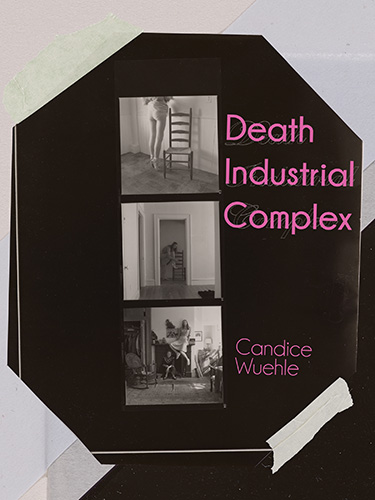
Death Industrial Complex
Candice Wuehle
ISBN 978-0-900575-06-8 | $18 | April 1, 2020
“i have a compulsion to place a mirror on every tombstone.”
Candice Wuehle’s Death Industrial Complex is a meditation on the cultural obsession with the bodies of dead women and an occult invocation of the artist Francesca Woodman. Like Woodman’s photographs with their long exposures and blurred lenses, this book is haunted and haunting, hazy yet devastatingly precise. These are poems as possessions, gothic ekphrases, dialogues with the dead, biography and anti-biography, a stunning act of “cryptobeauty.”
PRAISE FOR DEATH INDUSTRIAL COMPLEX
Fashioning her Francesca Woodman from gloves and veils, eels and electricities, Candice Wuehle’s Industrial Death Complex is the most exquisite pen pal, a Pretty Pretty Poltergeist, a portrait that evades as it enchants. “Writing with both hands,” Wuehle’s “unsuicide note” is a Josephus Thimister gown of a book, rawing its silks, shedding its skins, letting all that sad/badgirl beauty bleed on, bleed out.
—JoAnna Novak
Does this book expect you to hold its heels as it hovers? Does it want you to see it crawl from a tv set and then lock fingers with its girlish ghost? Is a mirror a weapon? Is ekphrasis a ghost mirror? Is there a stage, can you see it sideways, do you see the veil now? Do you take pleasure in the kind of gazing that turns your eyes into shimmery séance light? Do you want access to the “gate out of this world”? You bet your sweet ass you do, reader. “You can get married to a thing they say doesn’t even exist.” Did you see that glitch? Did you feel it in your curtain-y skeleton? Can you hear this call to cult from the broken record player, you little glitch baby?
“This is a story about how clothing was invented,” and sometimes this is an ekphrastic act, a companion text to the images and biography of Francesca Woodman, sometimes it’s memoir via possession (but how it defies “the petty/ contours of memoir”!), sometimes it’s poems as organelles, sometimes a study in trachophobia (fear of speed), sometimes a treatise on light and fashion and parents, sometimes an inquiry—deliciously terrifying—into “the extra stuff.” The stuff that impossibly lingers around liminal gates, salt crystals, “the rivulet of oil between/ the living dermis and the dead fil/ aments” of the scalp, light from the corner of a room, “pure gothic deep inside the erotic.”
I absolutely love the world of this book. It’s “something that sounds like bubbles of air bursting on the water’s surface” and that is the only place I ever, truly, want to be. It writes with both hands so that it can touch itself in the middle. It killed mary jane shoes. It made itself the gate and refused to demur because some lipsticks are better than others/ for writing your name on a mirror.”
—Olivia Cronk
PRAISE FOR WUEHLE’S PREVIOUS COLLECTION, BOUND
This is poetry that is feminine and magic on its own luminous terms, via a shimmering of the literary politic and its unspoken / spoken laws.
—Carrie Lorig
Language refuses to be anything but unbound. Resisting the strictures and corsets of settled form and content, and defying easy categorization, her poems cavort with stylish disobedience…
—Donna Stonecipher
ABOUT THE AUTHOR
Candice Wuehle holds an MA in literature from the University of Minnesota as well as an MFA in poetry from the Iowa Writers’ Workshop. She recently earned a doctorate in Creative Writing at The University of Kansas, where she was the recipient of a Chancellor’s Fellowship. Her studies focus on the relationship between trauma, memory and the occult. Her work can be found in Black Warrior Review, Tarpaulin Sky, The Volta, The Colorado Review, SPORK, and The New Orleans Review.